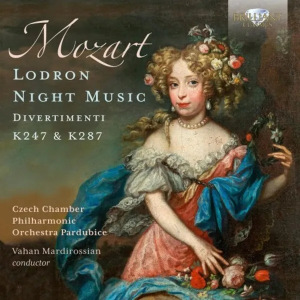
Wolfgang Amadeus Mozart (1756-1791)
Lodron Night Music
Divertimento in F K. 247 ‘Lodron Night Music 1’
Divertimento in B flat K. 287 ‘Lodron Night Music 2’
Czech Chamber Philharmonic Orchestra Pardubice/Vahan Mardirossian
rec. 2023, Suk Hall, House of Music, Pardubice, Czechia
Brilliant Classics 97307 [70]
Most of Mozart’s Serenades and Divertimenti are entertainment music, written to be performed at parties for aristocrats while they were chatting or feasting. Lucky aristocrats to have such music to accompany them! But lucky us too, who, thanks to recordings, can hear these delightful pieces whenever we like.
The two we have here. K. 247 and K. 287 were written for the for Countess Antonia Lodron, who was on friendly terms with Mozart and whose daughters were pupils of himself and his sister Nannerl. They were written for the name day on 13 June of the countess in 1776 and 1777 respectively. These two, together with K.334, were described by the great Mozart scholar Alfred Einstein as ‘among the purest, gayest, most satisfying, and most perfect that ever assumed musical form’ and he goes on ‘there are people who would trade a whole act of Tannhāuser or Lohengrin for one of these works, a lost paradise of music.’ Fortunately, we are not required to make such a trade.
Each these works is in six movements, with two slower movements, one an Andante and the other an Adagio, and also two minuets. They are written for two violins, viola and a bass which might be a cello or a double bass – opinions differ – and two horns. They can be played with just these forces, and this is, for example, how the Vienna Octet used to play them, However, they work equally well with a larger string band, and this is what Karajan used in a set of them which is alert, vivacious and light on its feet, which is not what one expects of Karajan’s Mozart. Here we have a string band, though a smaller one than Karajan used, and this seems just right.
There was also a March, K. 248 associated with K. 247. This would have been performed as the players brought the instruments to wherever they were to be based. It is not included here – there would probably not have been room – and anyway, no march survives for K. 287.
The first movement of K. 247 is in a loose sonata form with several good tunes. The Andante is a simple rondo with a lovely principal melody. The minuets are characteristic, the Adagio has florid writing for the violin and the finale features a charming motif in the horns which comes round again and again and is always welcome.
K. 287 is similar in structure, but it has a really virtuoso first violin part. Mozart himself played it at a later performance and said, ‘Everyone looked astonished, for I played as though I was the greatest violinist in Europe.’ This line is sensibly taken by a solo violin, presumably the orchestra’s leader, though he or she is not credited, and is given with style. The Andante here comes with variations. The Adagio has a very highly ornamented solo line for the violin. The finale features a folk tune whose words mean ‘The farmer’s wife has lost her cat.’ The Salzburg audience would have recognized this and been amused by it.
The orchestra here is the Czech Chamber Philharmonic Orchestra based in Pardubice in the Czech Republic. They are a well-established body who play with enthusiasm and sensitivity under their conductor, the Armenian Vahan Mardirossian, who is also a pianist and who enjoys a flourishing career mainly in Europe and East Asia. The recording is good, and the booklet offers a portrait of the countess on the cover as well as useful information inside, which I have drawn on.
This is not the first recording of these works that Brilliant Classics have given us. They are included in their complete set of Serenades and Divertimenti, played by various ensembles; there these two works are played by Camerata Bern under Thomas Furi. Those recordings were made between 1986 and 1992 (review), so it is not surprising that they decided it was time for a new one. There have, of course, been several other recordings, but these here seem to me delightful and entirely satisfactory. I hope this team go on to give us K. 334 and the related work K. 251, which adds an oboe to the ensemble and is perhaps less perfect than the others. Brilliant Classics may be a bargain label, but this is a quality production.
Stephen Barber
Buying this recording via a link below generates revenue for MWI, which helps the site remain free




















